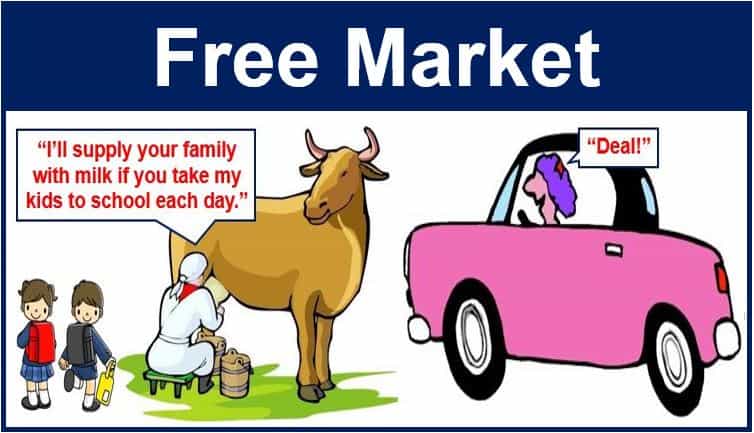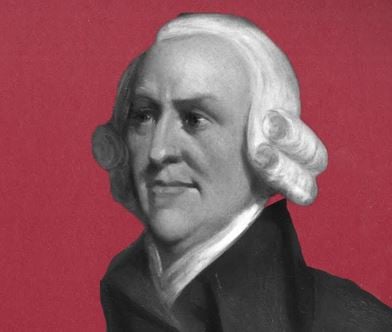What is a free market? Definition and meaning
A free market is an economic system in which the prices of goods and services are determined by market forces, i.e. supply and demand, rather than government controls, a price-setting monopoly, or some other authority. It is the same as an open market.
It contrasts with a regulated market, or command economy, where the government intervenes in supply and demand and does not let the market find its own way freely.
In a free market, most businesses and property belong to individuals and entities in the private sector, rather than the state.

In the advanced economies around the world, and several other democratic nations, the right-of-center political parties favor the free market, while the left of center support some kind of government control.
Although free markets are typically associated with capitalism in modern-day usage and popular culture, they have also been advocated by market socialists, profit sharing proponents, advocates of cooperatives, and free-market anarchists.
Free markets in finance
In financial markets, free market shares are securities that are extensively traded and whose prices are not affected by availability.
In the foreign-exchange world, a free market is one where exchange rates are not pegged by the government – they fluctuate freely through currencies’ supply and demand.
According to Oxford Dictionaries, a free market is:
“An economic system in which prices are determined by unrestricted competition between privately owned businesses.”
 Adam Smith, the ‘father of modern economics’, was a strong supporter of the free market.
Adam Smith, the ‘father of modern economics’, was a strong supporter of the free market.
Free market economies and competition
Supporters of a free market economy say it is driven by individual innovation and the idea that hard work and ingenuity are rewarded by success. Every company exists to make a profit. Therefore, in a free market, successful businesses make consistent profits in a level playing field filled with other competitors.
The notion of competition is a key component of a free market economy.
In a free marketplace with healthy competition, consumers get the best possible products and services at the best prices.
When a new product comes onto the market, it usually enters at a high price. After it has been on sale for some time, other competitors start copying it and offering improved versions, and the price falls.
In a free market, expensive and/or low-quality versions of a product or service will be rejected by consumers.
The winners and losers in each industry in a free market are determined by the demands of the customer.
Completely free markets do not exist
Many countries claim they have free market economies. However, there are not any completely free markets in the world today – the ones making those claims are mixed economies. Every nation has state-owned companies, and laws regarding intellectual property, making false claims, safety and quality, and honest behavior.
In the US, Canada, Europe, Japan and Australasia, you cannot buy certain medications at a pharmacy without a doctor’s prescription. This would not be the case in a theoretically totally free market.
Car makers are legally required to make sure their vehicles are roadworthy – they must adhere to safety regulations. People are not allowed to drive if they do not have a driving licence. Only qualified pilots are legally permitted to fly airplanes.
If you have a company that sells herbal teas, it is against the law for you to make claims in your advertising that some of your products can fix a broken leg, or restore eyesight in blind people.
Adam Smith
Adam Smith (1723-1790), a Scottish philosopher and pioneer of political economy, known today as the father of modern economics, laid the foundations of classical free market economic theory.
Mr. Smith believed that markets work best when free, without government interference. His followers today belong to the Classical Economics school of thought. They insist that any changes in supply will eventually be matched by adjustments in demand.
Mr. Smith said that if left to find its own way, a free market will always eventually move towards equilibrium. Market equilibrium is reached when demand for and supply of a good or service are the same.
His famous book – “An Inquiry into the Nature and Causes of the Wealth of Nations“ – convinced many economists at the time that free markets would work more successfully than protectionism, which had been widely and accepted and practiced. Protectionism refers to limiting imports by imposing tariffs, quotas, and other barriers to trade.
Quotes from famous people
Milton Friedman (1912-2006), an American economist who received the 1976 Nobel Memorial Prize for Economics, once said:
“The black market was a way of getting around government controls. It was a way of enabling the free market to work. It was a way of opening up, enabling people.”
Sir Stelios Haji-Ioannou, a British entrepreneur of Greek-Cypriot origin, founder of low-cost airline easyJet, said:
“I’m not a communist – I believe in the free market and that entrepreneurs should be allowed to take risks because it creates wealth and jobs, but I draw the line at people risking other people’s money. That’s deplorable.”
There are many economic systems in the world today. In ancient times, there was the Traditional Economic System, when humans hunted and lived on subsistence farming. The opposite of a free market system is a communist system.
Video explaining what libertarians mean by “the free market”
In this libertarian video, the speaker explains that free markets are much more than multinational companies, large banks, and stock brokerages in Wall Street.

